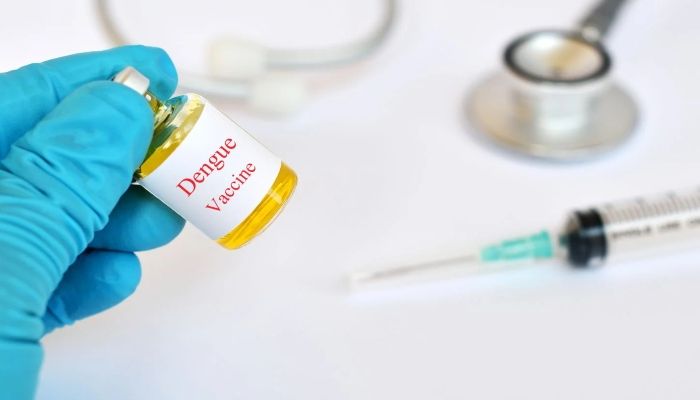
Publish: 28 Sep 2023, 03:05 pm

Dengue vaccine || Representational Image
For the first time, a dengue vaccine has been successfully tested in Bangladesh. Researchers at the International Centre for Diarrheal Disease Research, Bangladesh (ICDDR,B) and the Lerner College of Medicine at the University of Vermont (UVM), USA, have successfully tested the vaccine.
There are four types of dengue virus, Dengue-1, Dengue-2, Dengue-3, and Dengue-4. Experimental application of the vaccine has shown that the vaccine is effective against all four types. The vaccine is named TV-005 (Tetravalent).
A report on the successful trial of the vaccine was published in the international journal The Lancet Infectious Diseases on Wednesday (September 27).
A randomized, phase II clinical trial evaluated the safety, immunogenicity, and immunity status of TV-005 tetravalent live-attenuated dengue vaccine for up to three years, according to the published research report. Antibodies to all four dengue serotypes were detected in most volunteers after vaccination. Antibodies have been found to be higher in those who have previously been infected with dengue. Although the study was not designed to evaluate efficacy, so far no cases of dengue infection have been detected in vaccinated individuals.
In addition to making the TV-005 dengue vaccine suitable for widespread use in dengue-prone populations, these findings will help garner support for conducting phase III efficacy trials, the paper said.
ICDDRB scientist Mohammad Shafiul Alam, one of the vaccine researchers, said this is a promising development. This is hopeful news as dengue is rampant in the country.
The second phase of the dengue vaccine TV-005 trial in Bangladesh started on March 13, 2016, and ended on February 14, 2017.
192 people participated in it, and all of them participated voluntarily. Adults 18–50 years (20 males and 28 females), adolescents 11–17 years (27 males and 21 females), children 5–10 years (15 males and 33 females), and young children 1– 4 years (29 males and 19 females), randomized to vaccination or placebo in these four age groups. That is, 48 people participated in each group. Some of these people had previously had dengue and some had not. All the participants were Bangladeshis. Most side effects of the vaccine were mild.
One of the side effects was rash. Rash occurred in 37 (26%) of 144 vaccine recipients and 6 (12%) of 48 placebo recipients. Fever was present in 7 (5%) of vaccinees and a further 7 (6% of 108) experienced joint pain. All participants (142) were seropositive against most serotypes (DEN-1, DEN-2, DEN-3, DEN-4) 180 days after vaccination.
Researcher Mohammad Shafiul Alam said we have seen those who have been vaccinated till 2020. None of them contracted dengue. A single dose of this vaccine can provide protection. However, more research is needed on this vaccine. Because the second phase trial or test has been done in Bangladesh. This vaccine has completed 42 different phase trials in different countries of the world. Its third phase trial in India has started.
Regarding the price, Shafiul Alam said that three companies in India and a local pharmaceutical company in Vietnam have received permission to market this vaccine. Since local organizations have the opportunity to market these, I think the price will be affordable.
The vaccine was invented by the US National Institutes of Health (NIH). In addition to Mohammad Shafiul Alam, senior scientists of ICDDR, Rashidul Haque, Sazia Afrin and Md Masud Alam were involved in this vaccine research.
Subscribe Shampratik Deshkal Youtube Channel
Topic : dengue vaccine vaccine dengue Bangladesh
© 2024 Shampratik Deshkal All Rights Reserved. Design & Developed By Root Soft Bangladesh